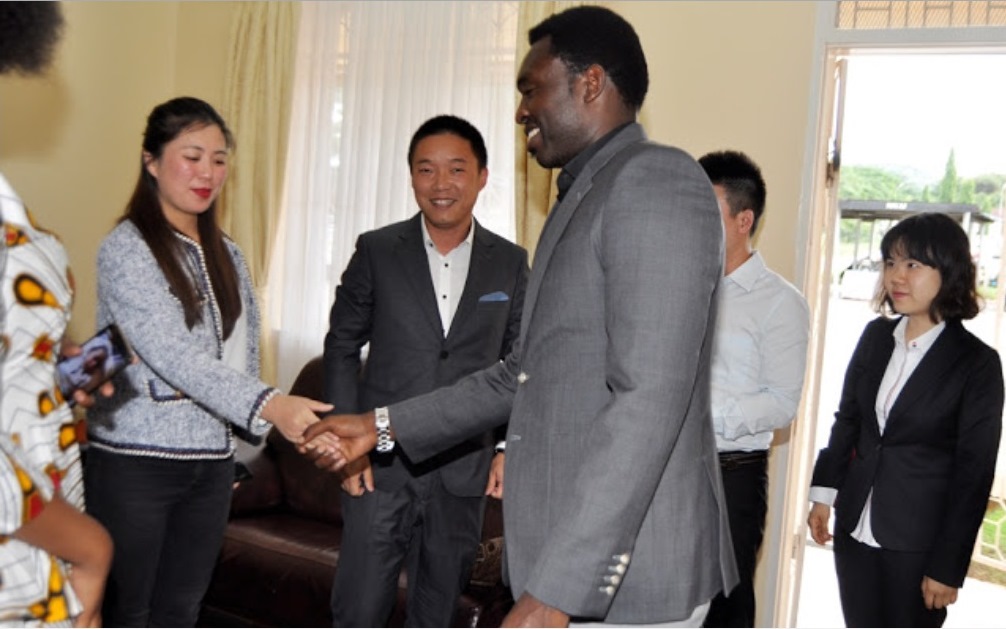
Minister for Natural Resources and Tourism Dr. Hamis Kigwangala, Center in Gray Suit, Meets Chinese Investors Delegation in Dodoma
By TZ Business News Staff.
The month of March 2018 witnessed a remarkable response from Chinese investors responding to Tanzania’s economic diplomacy.
The Chinese have expressed interest to invest in everything from tourism, to pharmaceuticals and medical equipment factories, to agro-processing and agribusiness, industrial parks, the manufacturing of industrial machines, setting up of industries to production of alcohol–particularly spirits and wines, furniture, as well as the processing of gold, copper and gemstones.
The Chinese company Tibet Dexin Financial Leasing announced the last week of the month it is building tourist hotels in the agricultural and tourist hotspots of Karatu, in the city of Arusha and in the wildlife paradise of Serengeti.
A media statement from the Ministry of Natural Resources and Tourism in Dodoma, central Tanzania, said Chairman of the Tibetan company who identified himself by only one name of Tony said the hotels to be built will reproduce Chinese cultural “taste” in the East African nation because they are meant to especially serve Chinese tourists.
Some 500 ‘safari vehicles’ will be brought into the country to transport an anticipated 200,000 Chinese tourists per year, compared to the current annual arrivals of Chinese tourists into Tanzania which stands at some 35,000 tourists, Tony is quoted as telling the Minister for Natural Resources and Tourism Dr. Hamis Kigwangala in Dodoma.
Tibet Dexin Financial Leasing also intends to start operating direct flight from China to Tanzania “in order to reduce travel time and the transport cost,” the Ministry said, adding that the company forecasts it will employ over 200 Tanzanians in this project.
Tanzania is currently actively engaged in economic diplomacy, where the focus is now on encouraging foreign investors to bring capital into the various investment areas that exist in the economy which has slowly evolved into a capitalist socialist economy the same way China has evolved.
In early February, 2018, Tanzania invited Chinese investors in the transport and hospitality sectors seeking to capitalise on its historical close ties with the economic giant.
The permanent secretary in the Ministry of Tourism and Natural Resources, retired Major General Gaudence Milanzi, said at the time that the invitation into the transportatation and hospitality sectors was meant to boost the tourism sector, and to increase the number of Chinese tourists visiting Tanzania.
“We need a plane that will fly straight from China to Tanzania. Further, we are inviting Chinese investors to build excellent hotels that will offer Chinese cuisines so that Chinese tourists feel at home while in Tanzania,” Major General Milanzi said during the opening of a one-day investment meeting in Dar es Salaam.
The meeting was organised by the Tanzania Tourist Board (TTB) to review efforts made by Tanzania and China in protecting game and promoting tourist arrivals. The TTB Board Chairman, retired Judge Thomas Mihayo told the meeting that 120 million Chinese tourists visit global destinations every year but only 30,000 of them actually visited Tanzania in 2016.
The Chinese ambassador in Tanzania, Ms Wang Ke, said China is determined to support Tanzania’s efforts to promote the national economy using various ways including tourism.
Meanwhile. The Permanent Secretary in the Ministry of Industry, Trade and Investment, Prof Elisante Ole Gabriel received a delegation of Chinese investors during the last week of March 2018. The delegation of socialist capitalists was led by the President of the China-Asia Economic Development Association’s Oversees Co-operation Development, Mr Huang Zhaojin.
Discussions between the Government Ministry and this delegation identified five priority areas for industrial investments with capacity to catalyse efforts by the government to achieve middle income economy by 2025. The investments can be implemented through the One Belt One Road Initiative, the deliberations point out.
Under the One Belt One Road initiative, China aims at promoting economic integration with other countries in the world as it seeks to promote competitiveness in the global economy.
Prof Ole Gabriel mentioned the five priority areas as pharmaceutical and medical equipment factories, agro-processing and agribusiness, setting up of industrial parks as well as manufacturing of industrial machines.
The list also includes setting up of industries to produce alcohol (particularly spirits and wines), making of furniture in addition to processing of minerals such as gold and copper in addition to gemstones.
The Chinese delegation was in the country for a four-day visit aimed at exploring investment opportunities, the Permanent Secretary said, adding that the discussed actually identified ten areas of investment but they agreed to start with the five priority areas, whose implementation should be fast-tracked.




